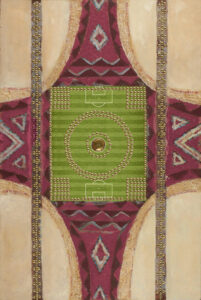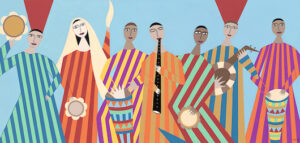In honour of the ‘FIFA World Cup Qatar 2022’, Emergeast, the MENA region’s leading online art gallery, is proud to present Carry Us Home, a female-led curated drop marking the first World Cup in the Middle East. Participating Artists: Ghada Al Khater, Shouq Al Mana, Helen Zughaib, Adra Kandil and Sara Tohme.

Al Bayt by Ghada Al Khater
At a time of increased opportunity for cross-cultural dialogue, false cultural assumptions on Qatar and the Middle East tainted the first week of the ‘FIFA World Cup Qatar 2022’. But despite it all, it certainly is looking like the region is bringing it home. Pride that is. Reflecting the region's efforts towards social and economic advancement in the past few years, the Middle East is relishing in the celebrations it so rightly deserves. From Doha's impeccable hosting to Saudi's triumphant win against Argentina, here are just a few reasons why we're already celebrating.
1.Unprecedented Female Representation
For the first time in World Cup history, three women referees have been selected to officiate the tournament. In an all-men event, this represents today's spotlight on female empowerment in the region.
"I am so proud to say as an Arab American, to see the World Cup taking place in the Middle East for the first time ever! To have people from across the globe coming together in a spirit of peace and humanity to our beautiful part of the world is the most incredible feeling of pride." - Helen Zughaib

Ahlan (Welcome) by Helen Zughaib
2.First FIFA World Cup Hosted by a Middle Eastern Country
For the first time in history, the FIFA World Cup is hosted in the Middle East. A big advantage to this historical move is that this tournament is more accessible to those in Asia, Africa and the Middle East who previously found it challenging to attend.
3.MENA Teams Surprise Fans
Saudi Arabia's win against Argentina left the world amazed with an outcome that ranks as one of the greatest shocks. Celebration was not only in Saudi Arabia but across the Middle East such as in Egypt, Jordan and Yemen. Iran, Morocco and Tunisia also followed suit with their victorious wins.

We Are Made of Each Other by Sara Tohme
4. Act of Resistance
As their country remains in turmoil, Iran players line up, taking a political stance by refusing to sing their national anthem in support of the brave Iranian women fighting for freedom. This act of resistance came at a price and the team was forced to comply in subsequent matches.
5. Increased Representation From The Region
British & French colonisation brought football to the region in effort to cultivate discipline and obedience amongst the colonised people. Football became a symbol of social and cultural independence amongst Arab nations thereon. This year's increased representation signifies a symbolic moment for the region.

Unity by Shouq Al Mana
6.Solidarity from the stands
During the challenging time for Iran, the crowd at the World Cup showed overwhelming support for the women-led protests in Iran wearing the national colours and holding the protest movement's sign 'Woman Life Freedom.'
According to the New York Times, Edward Said once said football, “represents a breathing space, allowing a splintered homeland an opportunity to join together around something shared." Similar to art, the World Cup is a cultural force in which we share our unified hopes and ambitions. As a region faced with many challenges, this historical moment is the time to join together around a sport so dearly loved by all.
To celebrate this, we asked 5 female artists to create an artwork reflecting the importance of this World Cup for the region. Carry Us Home is an opportunity for young collectors and art enthusiasts to collect a moment in history.

Carry You Home by Adra Kandil







